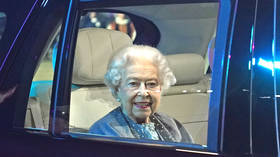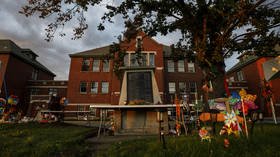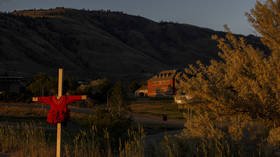Canada’s indigenous communities seek reparations from Elizabeth II

Canadian indigenous leaders and survivors of the residential school system plan to raise the issue of a formal apology and reparations from Britain’s Queen Elizabeth II later this week as her son and heir to the throne, Prince Charles, and his wife Camilla are to visit Canada.
Under the controversial school system, which has been officially likened to “cultural genocide,” more than 150,000 indigenous children were removed from their families and forced to attend church-run state schools across Canada until the late 1990s.
Cassidy Caron, the president of Canada’s Metis Council, the representative body of the Metis people of northwestern Canada, has said she would bring up the issue during her meeting with Prince Charles and Camilla, the Duchess of Cornwall, during a meeting at Rideau Hall.
"We need basic human necessities in our communities and it stems from colonization. It stems from assimilation and some financial reparations are absolutely helpful in helping us move forward,” Caron said.
The indigenous communities believe the Crown violated treaties it had signed with many of the First Nations that included vows to share resources. “The Queen is also a treaty member and she has an obligation to live up to the agreement," said Paul Andrew, who attended the residential school Grollier Hall in the town of Inuvik in the Northwest Territories.
"An apology would be good, but I think it is much more important that we see the kind of action that is needed," Andrew, who is the former chief of the Tulita community in the Northwest Territories, said, adding that the Queen should make sure that no more land is taken from the First Nations and their rights are respected. "We're demanding a new relationship … The ball is in their court,” Andrew said.
In its 2015 report on residential schools, Canada’s Truth and Reconciliation Commission identified the names of or information about more than 4,100 children who died in the system. However, the exact number remains unknown.
The Anglican Church, which is formally headed by the Queen, ran 36 residential schools – a number second to that of the schools operated by the Roman Catholic Church – between 1820 and 1969. It also ran over 150 Indian day schools during that period.
Piita Irniq, a former commissioner of Nunavut and a residential school survivor as well, said he would like Charles and Camilla to offer an apology and also to share what they learn from their trip with the Queen. "They should also apologize sincerely for the loss of our very Indigenous being," he has said, adding that it “would be a really good thing to do, also for healing and reconciliation between Anglicans, as well as the Royal people."
“They've done almost the same thing as the Roman Catholic Church in terms of loss of culture, loss of language, loss of traditional spirituality,” Irniq added, referring to the Anglican Church.
Charles and Camilla are to arrive to Canada for a three-day tour on Tuesday. The trip will involve a “solemn moment of reflection and prayer” at a Heart Garden planted in the memory of indigenous children who died at residential schools, according to the media. The visit will also include a prayer in Inuktitut, Mi’kmaq music, a feeding the fire ceremony, as well as visits to indigenous communities.
Canada is still reeling from last year’s discoveries of hundreds of unmarked graves at various former residential school sites. This revelation has prompted Ottawa to pledge “historic reparations” to the survivors in December 2021.
Pope Francis also apologized to the Canada’s First Nations communities in April when he met Canadian indigenous delegations. “It is chilling to think of determined efforts to instill a sense of inferiority, to rob people of their cultural identity, to sever their roots, and to consider all the personal and social effects that this continues to entail: unresolved traumas that have become intergenerational traumas,” he said.
The Archbishop of Canterbury Justin Welby followed his lead later the same month. "I am sorry that the church belittled your spirituality, denigrated and undermined your culture and tradition, and above all your language," he said at that time.
Not everyone agrees that exacting an apology from the Crown is the right thing to do, though. Murray Sinclair, former chair of the Truth and Reconciliation Commission, believes it could only make it all the worse.
"It will just detract from and distract us from the very important conversation we need to have about what can we do to change the way that we are, the relationships that we have,” said the former chair, who headed the effort to investigate the experiences of thousands of indigenous people who had been sent to residential schools as children.














